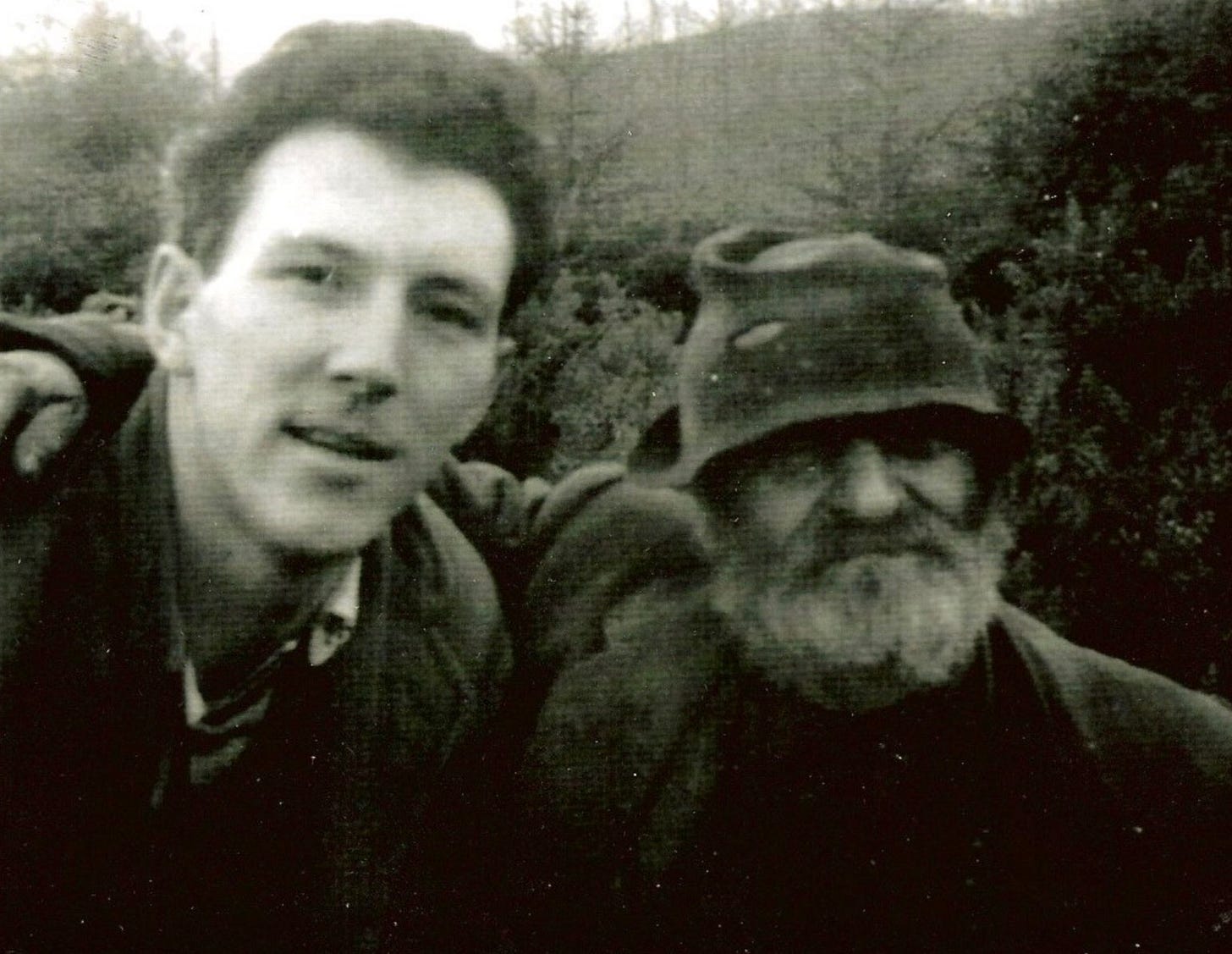16. Old Man of the Mountain
© Robbie O’Connell 1983 Slievenamon Music (BMI)
He was known locally by his nickname, Lackendarra or simply as The Hermit. I first became aware of him as a child on one of my family’s summer outings to Coumshingaun, a corrie lake in the Comeragh Mountains in County Waterford in the south-east of Ireland. Bearded and long haired, not a common sight in the 1950s, he was reputed to live in a cave shunning all human contact. Sometimes we thought we caught a glimpse of him in the distance but he invariably slipped away and disappeared. In my childish imagination, this gave him an air of great mystery, tinged with fear.
In reality, his name was Jim Fitzgerald, late of the British army and originally from the nearby townland of Lackendarra, from which he received his nickname. His parents had emigrated to America and left him to be reared by his grandparents. At the outbreak of the First World War, he joined the 2nd battalion of the Connaught Rangers and was deployed to France. In 1916 he fought the Turks in Mesopotamia in some of the most brutal battles of the war. When the war was over, he returned to Castlereagh, County Waterford, near where he had grown up.
It soon became obvious that he was “shell-shocked,” a term used in those days to describe what we now call PTSD, post traumatic stress disorder. He couldn’t hold down a job and drank heavily to try to cope. He wandered from place to place but could never find the peace he sought until he found a cave in the foothills of the Comeragh Mountains where he decided to settle. He made a sleeping place with sheep’s wool that he collected from briars and fences. He built a rudimentary hut beside his cave where he was able to cook his food. He snared rabbits, grew potatoes, and gathered blackberries. He supplemented this diet with things like canned vegetables and condensed milk that he bought in the nearby village of Clonea-Power, which he visited every fortnight to collect his army pension of £2 a week.
Despite his mostly successful efforts to avoid people, he usually drank in one of the local pubs when he collected his pension before returning to his mountain retreat. Ironically, his life as a hermit made him something of a celebrity and those who hiked the mountains were always on the lookout for him.
My grandmother and my uncle Bobby Clancy, suddenly came upon him one summer’s day and he immediately sat down on the ground and chatted with them. Bobby managed to get a photo with him before moving on. When he looked back he saw Lackendarra scurrying away and noticed that the seat of his pants was all torn and tattered, which probably explains why he sat and talked to them.
When I heard the news of his death, in 1959, it was probably the first time that the concept of death, and the finality of it, resonated with me. About twenty years later, on climbing to Coumshingaun, those memories came back and inspired this song.
There is a very moving documentary on the Rathgormack community site under History: People of Note.1
Old Man of the Mountain
© Robbie O’Connell 1983 Slievenamon Music (BMI)
Lyrics:
His story must have started when he was in the 1st World War Many times I’ve heard that was the bloodiest war of all. He must have made his mind up then, if he saw it to the end, He’d have to make some changes when he’d come home again. And when the war was over he could never settle down He’d work some times for farmers and he’d move from town to town. He never really made a plan, he just lived from day to day. He didn’t seem to notice as the years just slipped away. Chorus: Old man of the mountain, what happened in the war? Was something lost forever there that you were searching for? Or was it fear of killing or the fear of being killed That made you want to live out there alone upon the hills? And when the second war began in nineteen thirty nine He went into the mountains and he left the world behind. They only saw him in the town when his army pension came. Then he’d stock up his provisions and be on his way again. And in the Comeragh mountains, he lived for twenty years Like a hermit in the wilderness with his ragged clothes and beard Some said that he was crazy, or that he was just afraid Some saw a quiet dignity in his solitary ways. I can still remember the day I heard he’d died I was only eight or nine, but it touched me deep inside For though I never knew him, I still felt I’d lost a friend There was something gone forever that I wouldn’t find again.
https://rathgormack.ie/history/



Amazing story, wonderfully captured in song.
Thanks for this. Robbie. Especially good to remember at Armistice Day and Veteranss Day time